For the FITs | Heart Failure Fellowship and the Failure of Recruitment

This past December I had the privilege of matching to a fellowship in Advanced Heart Failure (HF) and Transplant Cardiology and I couldn't be more excited to join this field. However, only 60 other colleagues matched alongside me. This represents the smallest class in recent years. This year, a record number of spots went unfilled. Of the 127 positions offered, only 61 (48%) were filled and of the 75 programs participating in the match, only 21 (28%) filled all their available positions.1
With an ever-growing population of HF patients, it seems counterintuitive that fewer cardiology fellows are pursuing careers in this field. I took this as an opportunity to reflect on my path to pursuing advanced HF, and to evaluate why others might not be choosing that same path.
My love for advanced HF started in medical school, when I watched a very young woman have worsening peripartum cardiomyopathy that ultimately required a heart transplant. I had the privilege of caring for her on my obstetrics, cardiac surgery and cardiac intensive care unit (CICU) rotations; it was the opportunity to provide both a high level of care in the acute setting, as well as longitudinal care, that interested me in HF.
Although my interest in HF started with transplantation, it was not the only reason I chose HF. As an intern in the CICU, I watched the HF attendings (who seemed to be perpetually on service in the CICU in the Spring and Summer of 2020) care for critically ill patients, often with Covid acute respiratory distress syndrome and multi-organ failure. I was floored by how these cardiologists still retained such critical care skill. It was after the first wave of Covid that I realized I needed a critical care component to my career, something that HF provides.

Throughout my time in fellowship, it has been a privilege to work with HF physicians in multiple different settings. This includes not only the CICU and overnight shock calls, but also the outpatient setting, catheterization, multidisciplinary meetings and other venues. What persistently impressed me about them was their never-ending advocacy for their patients and their knowledge of not just cardiology, but all of internal medicine.
Advanced HF is not solely heart transplantation and ventricular assist devices (VADs). The field is providing an ever-increasing array of therapeutics, including but not limited to medications, procedural interventions, integrative therapy and palliative care. As such, Advanced HF fellowship not only provides education on the care of heart transplant and VAD patients, but also critical care training and training on how HF interacts with the rest of internal medicine.
In particular, I've noticed a shift in the specialization of those who are keenly interested in cardiogenic shock and the CICU. While previously HF fellowship was the home of cardiogenic shock, there is now an alternative pathway for those whose passion is cardiogenic shock and the care of critically ill patients - fellowship in cardiac critical care (CCC). However, the rise of CCC as a specialty does not in any way diminish the excellent training in cardiogenic shock that HF fellows receive. There will always be a role for HF physicians as an integral part of the CICU team.
The question remains: How do we convince more applicants that these benefits exist? With an increasing number of fellows planning to dual board (myself included), there is a push towards more and more specialization (and consequently more years of training). Applicants with an interest in working in the CICU such as myself are dual-boarding in HF and critical care. Applicants who want to specialize in mechanical circulatory support are dual-boarding in HF and interventional cardiology. However, there comes a point when trainees are understandably reluctant to add even more years onto their training.
This is perhaps a reason that not every HF fellowship should look exactly the same. Some fellows could do a pathway that focuses on HF and CCC, while others could complete a pathway that allows for more time in the catheterization lab. One could also imagine a role for a HF fellowship that focuses on palliation and symptom management for patients not offered advanced therapies.
If HF were able to offer certificates in other disciplines based on experience during the advanced HF year, including, but not limited to, critical care, interventional cardiology (specifically the placement of mechanical circulatory support devices), integrative medicine and palliative care, it would be a more alluring and practical pathway for those who want to work at the intersection of HF and other disciplines.
Lastly, my peers who considered, but chose not to pursue a HF fellowship, have cited compensation as one of the main reasons. In contrast to procedural specialties such as interventional cardiology or electrophysiology, where the additional year of training (and forgone attending salary) promises increased compensation down the line, HF training typically does not lead to additional compensation. To recruit more cardiology fellows into this field, pay must be commensurate with the services HF specialists provide. They take care of some of the sickest patients and often field calls at all hours of the day – reimbursement should reflect their dedication to the field and to its demands
While fewer chose to pursue Advanced Heart Failure and Transplantation Fellowship in the year ahead, that should not be taken as an indictment of what is a growing field with an ever-increasing array of therapeutics available and an ongoing role in the care of critically ill cardiac patients. It should, however, be seen as a call to action for the field and training programs to provide individuals with pathways to their career goals without adding on years of training and for institutions to value their HF physicians commensurate with the comprehensive care that they provide.

Reference
- Residency Matching Program. 2024. Available here.
Clinical Topics: Heart Failure and Cardiomyopathies, Acute Heart Failure
Keywords: Cardiology Magazine, ACC Publications, Intensive Care Units, Critical Care, Fellowships and Scholarships, Heart Failure
